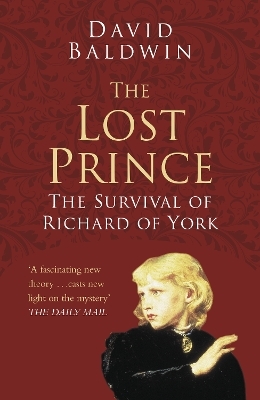
The Lost Prince: Classic Histories Series
The Survival of Richard of York
2016
The History Press Ltd (Verlag)
978-0-7509-7856-9 (ISBN)
The History Press Ltd (Verlag)
978-0-7509-7856-9 (ISBN)
The story of the Princes in the Tower is one of history’s most enduring, poignant and romanticised tales. Dead princes were a potential embarrassment, but a living prince would have been a real danger and a closely guarded secret, not only in Richard’s reign but in the reigns of Henry VII and Henry VIII.
Did Richard, Duke of York, the younger of the Princes on the Tower, survive his imprisonment? In this revealing new book medieval historian David Baldwin presents an original and intriguing scenario. On 27 December 1550 an old man named Richard Plantagenet was buried at Eastwell in Kent. He had spent much of his life working as a bricklayer at St John's Abbey, Colchester, but, unusually for a bricklayer, he could read Latin. Reluctant to give any account of his background, he eventually told his employer that he was a natural son of Richard III. Yet, if this was true, why was he not publicly acknowledged by the king? Richard III made provision for his other bastards, John of Gloucester and Katherine. The fact that he was called Richard Plantagenet is also revealing. Had he simply been Richard III's bastard, he would have been styled 'of Gloucester' or given the name of his birthplace. And, most tellingly of all, where is the evidence that Prince Richard actually died? David Baldwin opens up an entirely new line of investigation and offers a startling solution to one of the most enduring mysteries in English history and a final exoneration for Richard III.
Did Richard, Duke of York, the younger of the Princes on the Tower, survive his imprisonment? In this revealing new book medieval historian David Baldwin presents an original and intriguing scenario. On 27 December 1550 an old man named Richard Plantagenet was buried at Eastwell in Kent. He had spent much of his life working as a bricklayer at St John's Abbey, Colchester, but, unusually for a bricklayer, he could read Latin. Reluctant to give any account of his background, he eventually told his employer that he was a natural son of Richard III. Yet, if this was true, why was he not publicly acknowledged by the king? Richard III made provision for his other bastards, John of Gloucester and Katherine. The fact that he was called Richard Plantagenet is also revealing. Had he simply been Richard III's bastard, he would have been styled 'of Gloucester' or given the name of his birthplace. And, most tellingly of all, where is the evidence that Prince Richard actually died? David Baldwin opens up an entirely new line of investigation and offers a startling solution to one of the most enduring mysteries in English history and a final exoneration for Richard III.
The late David Baldwin taught medieval history and was the author of 'Elizabeth Woodville: Mother of the Princes of the Tower' and 'The Lost Prince: The Survival of Richard of York'.
| Erscheinungsdatum | 08.10.2016 |
|---|---|
| Zusatzinfo | 22 Illustrations, black and white |
| Verlagsort | Stroud |
| Sprache | englisch |
| Maße | 129 x 198 mm |
| Themenwelt | Literatur ► Biografien / Erfahrungsberichte |
| Sachbuch/Ratgeber ► Geschichte / Politik | |
| Geschichte ► Allgemeine Geschichte ► Mittelalter | |
| Geschichte ► Teilgebiete der Geschichte ► Kulturgeschichte | |
| ISBN-10 | 0-7509-7856-2 / 0750978562 |
| ISBN-13 | 978-0-7509-7856-9 / 9780750978569 |
| Zustand | Neuware |
| Haben Sie eine Frage zum Produkt? |
Mehr entdecken
aus dem Bereich
aus dem Bereich
eine neue Geschichte des Mittelalters
Buch | Hardcover (2023)
C.H.Beck (Verlag)
38,00 €


